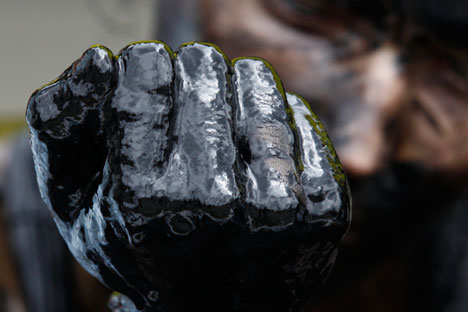
The baseline scenario of the Economic Development Ministry for 2016 expects the price of Urals oil to be $50, while the conservative forecast pitches prices at $40 per barrel.
ReutersAs global oil prices continue to slide, Russia’s embattled oil companies are being forced to further tighten their belts as they attempt to plan their budgets for 2016, with a lack of resources meaning that planned development projects are being put on hold.
On Tuesday, Dec. 8, Brent futures for January were trading at $40.44 a barrel, but during the day the price dropped to $39.85, meaning that oil had fallen for second consecutive session: On Dec. 7, quotes fell by 5.3 percent, on Dec. 8 – by another 0.7 percent (as of 19:00 Moscow time).
The reason is OPEC's Dec. 4 refusal to fix the level of production within the cartel's traditional quotas. The lack of an established limit could mean that next year will see even more oil coming to the market from OPEC countries, including sanction-free Iran, reports Bloomberg.
The average price of Urals crude has stood at $52.16 per barrel since the beginning of the year; on Dec. 8, it fell to $38.34. According to the Ministry of Energy, the economy of Russian companies allows them to earn if the price of oil is below $50 a barrel. But under the current tax system, with such prices they have no resources and incentives to invest in new fields.
Large companies have already decided to freeze projects, with Russia's largest oil producer Rosneft making adjustments to the timetable for developing nine fields.
Rosneft President Igor Sechin said as early as at the St. Petersburg economic forum in June that the existing oil prices (a barrel of Brent was about $63 at the time) do not provide oil producers with a steady return.
In order to avoid another price shock and critical financial losses, the cost of oil, according to him, should return to $80 a barrel. But in late November, Sechin said he did not expect a market recovery before the second half of 2017.
A spokesman for Rosneft did not elaborate on Dec. 8 what price it is setting for next year's budget.
Lukoil is drawing up its 2016 budget based on a "conservative forecast" of $50 a barrel, its vice-president and co-owner Leonid Fedun said in late November.
But oil producers could protect their investments and explore new fields, including the Arctic, if prices return to the range of between $65 and $90 per barrel, said the company's CEO Vagit Alekperov back in summer.
Among other Russian producers, Gazprom Neft is adhering to a conservative approach and setting a price of $45 per barrel for the next three years at once, said Chief Financial Officer Alexei Yankevich in November.
RussNeft, meanwhile, produced the same forecast – $45 per barrel and 70 rubles per dollar, the company's main owner Mikhail Gutseriyev said in an interview to the Russia 24 television channel on Dec. 8.
"Due to exchange rate differences and a tax maneuver we are operating almost on the verge of profitability. We hope to make a profit after 2018," he said.
Bashneft produced the most optimistic forecast, with the company drawing up next year's budget based on a price of $60 per barrel, its financial director Alexei Lisovenko said, reporting on the third quarter.
Russian oil companies are being assisted by the ruble rate, which is falling in tandem with oil prices, and flexible tax rates – on average, companies in the sector break even at an oil price of about $30 per barrel, while this threshold is even lower for Rosneft and Bashneft – less than $20 a barrel, Merrill Lynch analysts wrote in their November report. The critical level for foreign majors such as BP, Total and Eni, according to the calculations of the bank, is a fall in prices below $60 a barrel.
The baseline scenario of the Economic Development Ministry for 2016 expects the price of Urals oil to be $50, while the conservative forecast pitches prices at $40 per barrel. According to the conservative scenario, oil will stay at $40 until 2018.
Falling oil prices is a long-term trend associated with the loss of the key driver in the oil market – demand from China, said former finance minister Alexei Kudrin, now head of the Committee of Civil Initiatives.
According to Kudrin, oil will remain below $50 per barrel after the 2018 presidential elections, and this will be an incentive for reform.
Full article in Russian in RBC Daily.
All rights reserved by Rossiyskaya Gazeta.
Subscribe
to our newsletter!
Get the week's best stories straight to your inbox